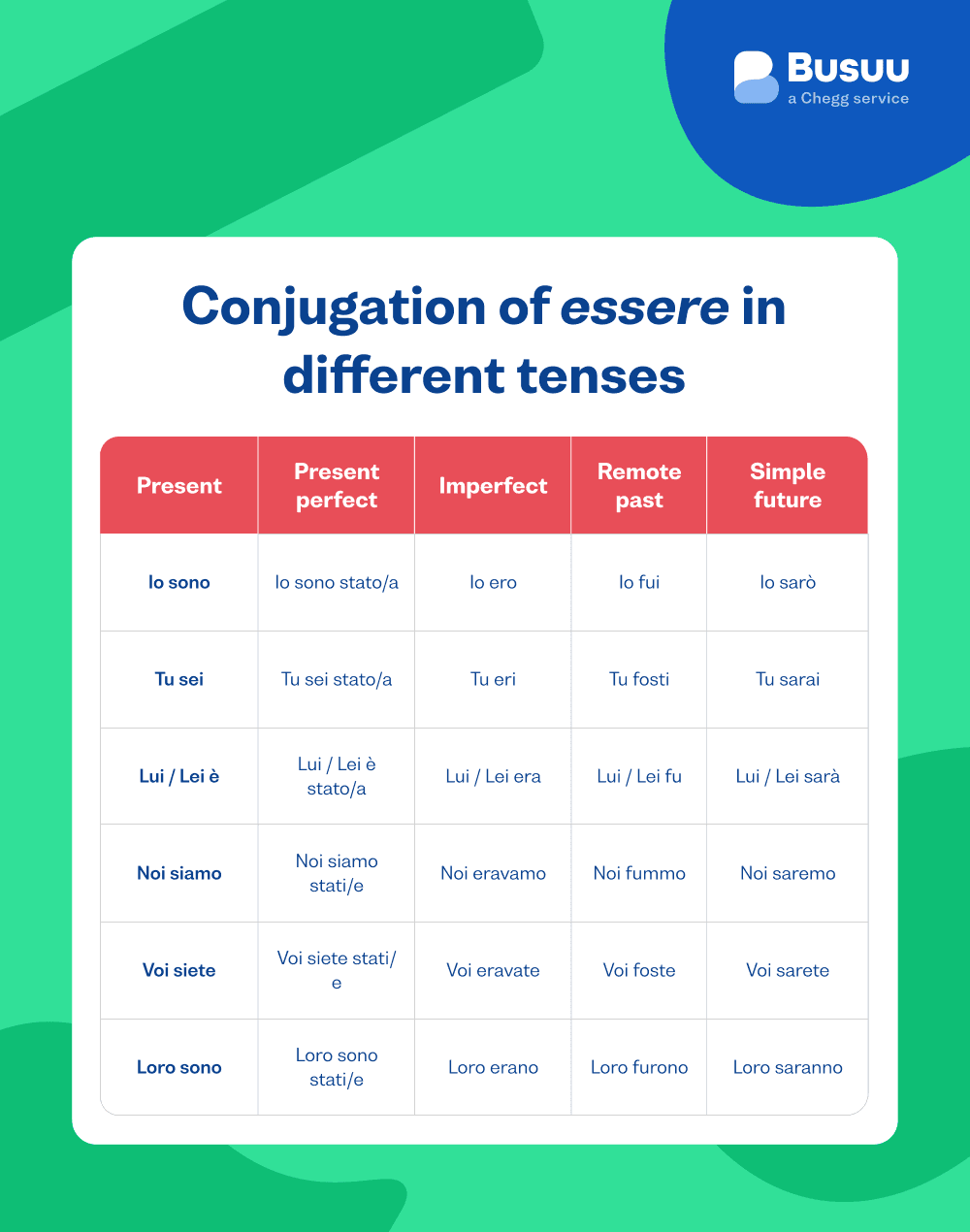I want to learn...
Essere is the Italian verb for “to be”, and if there’s any verb you should learn first, this is the one! It's not only the most common verb in Italian, it is also an auxiliary verb, like avere (to have), so it combines with other verbs to make different verbal tenses.
Essere is also very irregular, and so the only way to learn it is by memorizing each of its tenses and moods. Today, let’s learn how to conjugate essere and begin using it in sentences!
Essere Conjugation: How to say “there is” and “there are” in Italian
Before we get to the different tenses and moods of essere, you should know one of its most common and important everyday usages. When it’s together with ci, it means “there is” and “there are”. The bolded parts below are the conjugated forms of essere.
Ci è is shortened to c’è, meaning “there is”.
Example: C’è il pane in cucina. (There is bread in the kitchen.)Ci sono translates to “there are” in English.
Example: Ci sono molti gatti. (There are many cats.)

Present tense –indicativo presente
The present tense ofessere is the first one you should learn. It conjugates (changes) according to the person we are talking about or personal pronoun.
Let’s take a look at the six pronouns and how essere conjugates to each of them. The “to be” verb is in bold below:
How to conjugate essere in the present tense
| Italian pronoun + essere verb | English translation |
|---|---|
| Io sono | I am |
| Tu sei | You are |
| Lui / Lei è | He / She is |
| Noi siamo | We are |
| Voi siete | You are |
| Loro sono | They are |
Good to know: Because every pronoun receives its own unique form of the verb, Italians often omit the pronoun so long as it’s understood who is being talked about. For example, it’s possible to say “Lui è stanco” (he is tired) without lui, becoming “è stanco.”
Here are some examples of essere in the indicativo presente in a sentence:
Sono americano / americana. (I’m American.)
Lui è un amico di Julia. (He’s a friend of Julia’s.)
Siamo in vacanza. (We’re on vacation.)
Sei felice? (Are you happy?)
Present perfect –passato prossimo
Present perfect or passato prossimo is the most commonly used past tense in Italian, and indicates the action has already started and ended by the time of speaking. But despite the action happening in the past, this tense signals that the action is still relevant or “close” to the present.
Here’s how we conjugate this in Italian with essere.
How to conjugate essere in the present perfect
| Italian pronoun + essere verb | English translation |
|---|---|
| Io sono stato/a | I have been |
| Tu sei stato/a | You have been |
| Lui / Lei è stato/a | He / She has been |
| Noi siamo stati/e | We have been |
| Voi siete stati/e | You have been |
| Loro sono stati/e | They have been |
In Italian, passato prossimo is a compound tense, meaning it contains two verbs: in this case, the conjugated, simple form of essere and the past participle stato.
Stato will agree with the pronoun’s number (plural or singular) and gender (masculine or feminine), so the ending will change:
Stato = singular masculine
Stata = singular feminine
Stati = plural masculine
State = plural feminine
Let’s take a look at some examples of
Sono stata in Italia. (I’ve been to Italy.)
Sei stato in questo ristorante? (Have you been to this restaurant?)
Siete stati tutti in piscina. (You have all been at the pool.)
Siamo state a fare shopping. (We have been shopping.)
Imperfect –imperfetto
The imperfect tense indicates an action that lasted for a long or undefined amount of time in the past. Unlike passato prossimo, which generally indicates an action that happened once, imperfetto is used for past actions that happened repeatedly or continuously.
How to conjugate essere in the imperfect tense
| Italian pronoun + essere verb | English translation |
|---|---|
| Io ero | I was |
| Tu eri | You were |
| Lui / Lei era | He / She was |
| Noi eravamo | We were |
| Voi eravate | You were |
| Loro erano | They were |
Let’s see this tense in some examples:
Quando ero un bambino, ero molto magro. (When I was a child, I was very thin.)
L’anno scorso c’era un nuovo orso allo zoo. (There was a new bear at the zoo last year.)
Eravate troppo giovani. (You all were too young.)
Erano studenti all’università? (Were they students at the university?)
Remote past –passato remoto
The remote past refers to events that happened a long time ago. This tense isn’t often used on its own, especially when in spoken conversation. But it’s commonly found in literature or as an important building block for other tenses, like the trapassato remoto (preterite perfect) – if you want to start reading Italian novels, we recommend studying this!
How to conjugate essere in the remote past
| Italian pronoun + essere verb | English translation |
|---|---|
| Io fui | I was |
| Tu fosti | You were |
| Lui / Lei fu | He / She was |
| Noi fummo | We were |
| Voi foste | You were |
| Loro furono | They were |
Examples of
Il nostro primo incontro fu memorabile. (Our first meeting was memorable.)
I romani furono qui molto tempo fa. (The Romans were here a long time ago.)
Fui un’attrice negli anni ‘60. (I was an actress in the 1960s.)
Quando combattesti nell’ultima guerra fosti fortunato. (When you fought in the last war, you were lucky.)
Simple future –futuro semplice
Let’s get out of the past and move to the future. In Italian, the future tense not only refers to future actions, but can also be used to express doubt or speculation in everyday conversations.
How to conjugate essere in the simple future tense
| Italian pronoun + essere verb | English translation |
|---|---|
| Io sarò | I will be |
| Tu sarai | You will be |
| Lui / Lei sarà | He / She will be |
| Noi saremo | We will be |
| Voi sarete | You will be |
| Loro saranno | They will be |
Let’s see how this tense looks in action:
Sarò a Milano il mese prossimo. (I’ll be in Milan next month.)
Sarai a casa domani? (Will you be home tomorrow?)
Qualcuno ha bussato alla porta. Sarà Giovanni? (Somebody knocked on the door. Could it be Giovanni?)
Saremo presto alla festa. (We will be at the party soon.)
Saranno pronti per la cena tra un’ora. (They will be ready for dinner in an hour.)
Imperative –imperativo
Moving away from the indicative mood, let’s take a look at the imperative mood.Imperativo is used for giving commands or orders. For this, there is no first person form (io). Imperative verbs are usually employed without the pronoun.
How to conjugate essere in the imperative mood
| Essere verb | English translation |
|---|---|
| Sii | Be! |
| Sia | Let he / she / it be / May he / she be! |
| Siamo | Let us be! |
| Siate | Be! |
| Siano | Let them be / May they be! |
The most common pronouns to hear this imperative mood with are the second person pronouns, tu and voi.
Note: If you are making a negative command, for the 2nd person singular (tu) you will use the infinitive (unchanged verb), which in this case is essere. Example: Non essere così! (Don’t be like that!)
Here’s how the
Sii buono! (Be good!)
Che siano misericordiosi. (May they be merciful.)
Siamo orgogliosi di noi stessi! (Let’s be proud of ourselves!)
Gerund –gerundio
Our last conjugation of essere for today is the gerund form. In English, this looks like “being”. Gerund is invariable in Italian and doesn't conjugate depending on number and gender, unlike the indicativo and imperativo moods we have seen here. It indicates an action happening or continuing at the moment of speaking or having a consequence on another action.
How to conjugate essere in the gerund form
| Present | English translation | Past | English translation |
|---|---|---|---|
| Essendo | being | Essendo stato/a/i/e | having been |
Examples of
Essendo a New York, ho provato la pizza new yorkese. (Being in New York, I tried New York pizza.)
Essendo malato, non va al lavoro. (Being sick, he isn’t going to work.)
Essendo stato in Spagna per due anni, parlo spagnolo. (Having been in Spain for two years, I speak Spanish.)
Congratulations! You’ve now covered all of the tenses of the indicative mood of essere, plus the imperative and gerund forms. Conjugating essere can be tough. Because it’s so irregular, the only way to begin using it is to memorize it. However, committing it to heart doesn’t have to be boring!
With Busuu, you can learn tricky conjugations with ease. We help Italian learners practice with support from our online community and language courses!
Newlanguages


